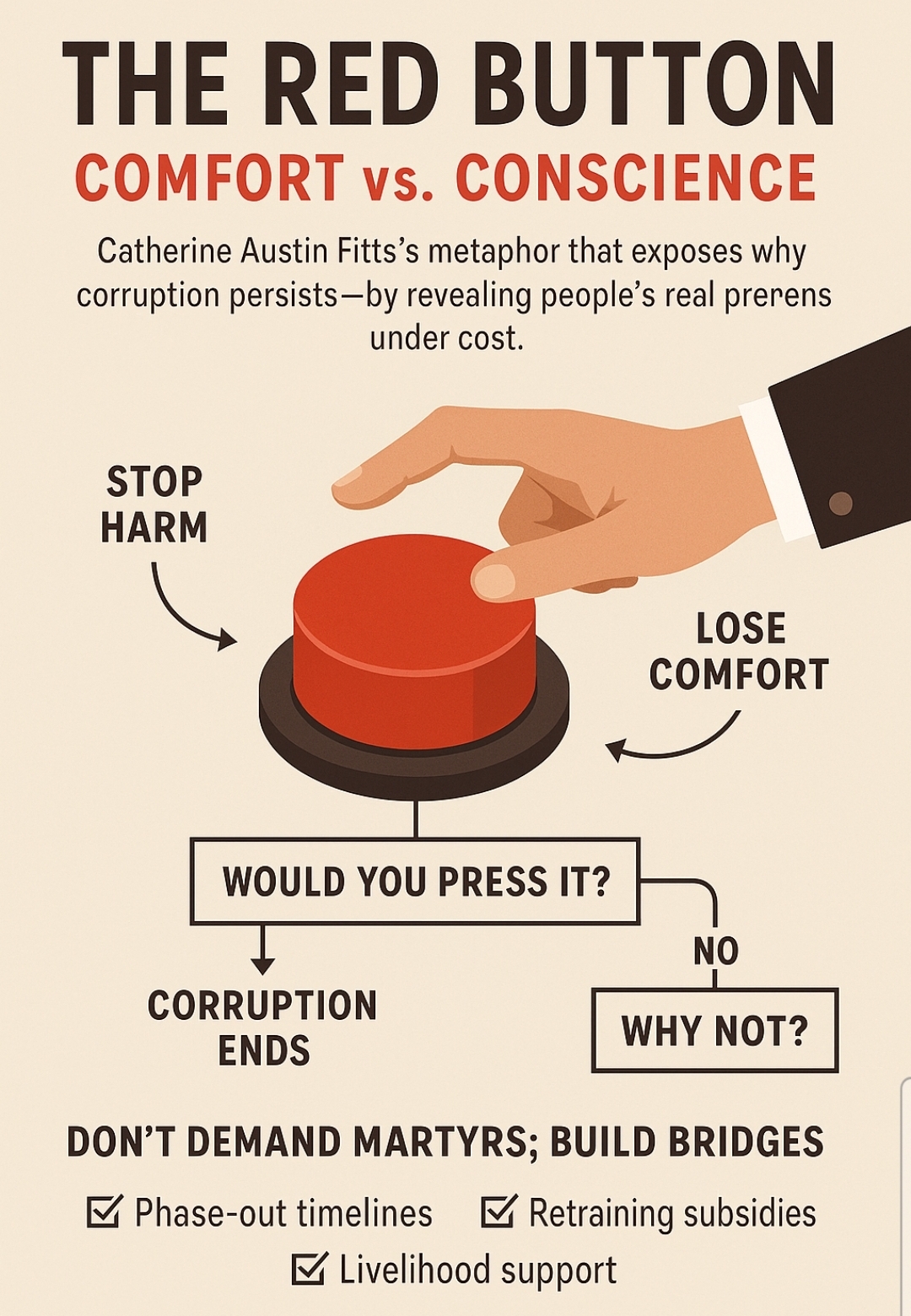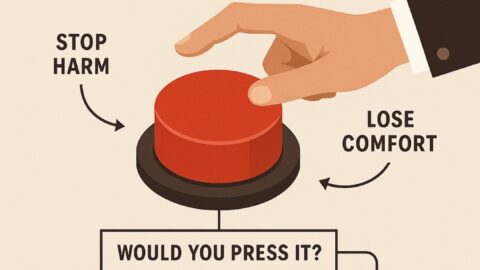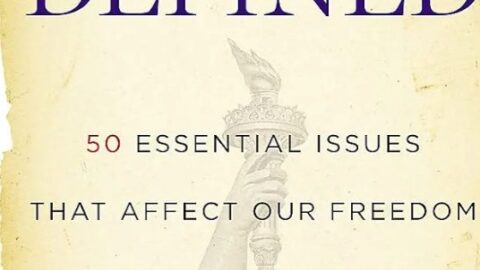Executive Summary
Catherine Austin Fitts’s “Red Button” is a vivid thought experiment about complicity. Imagine a button that—if pressed—would end a destructive system (war profiteering, financial fraud, surveillance capitalism). Almost everyone says they oppose the system; yet very few would press the button if it meant losing their job, status, 401(k), or social peace. The metaphor lays bare a hard truth: corruption persists not only because of villains, but because ordinary, good people trade conscience for comfort.
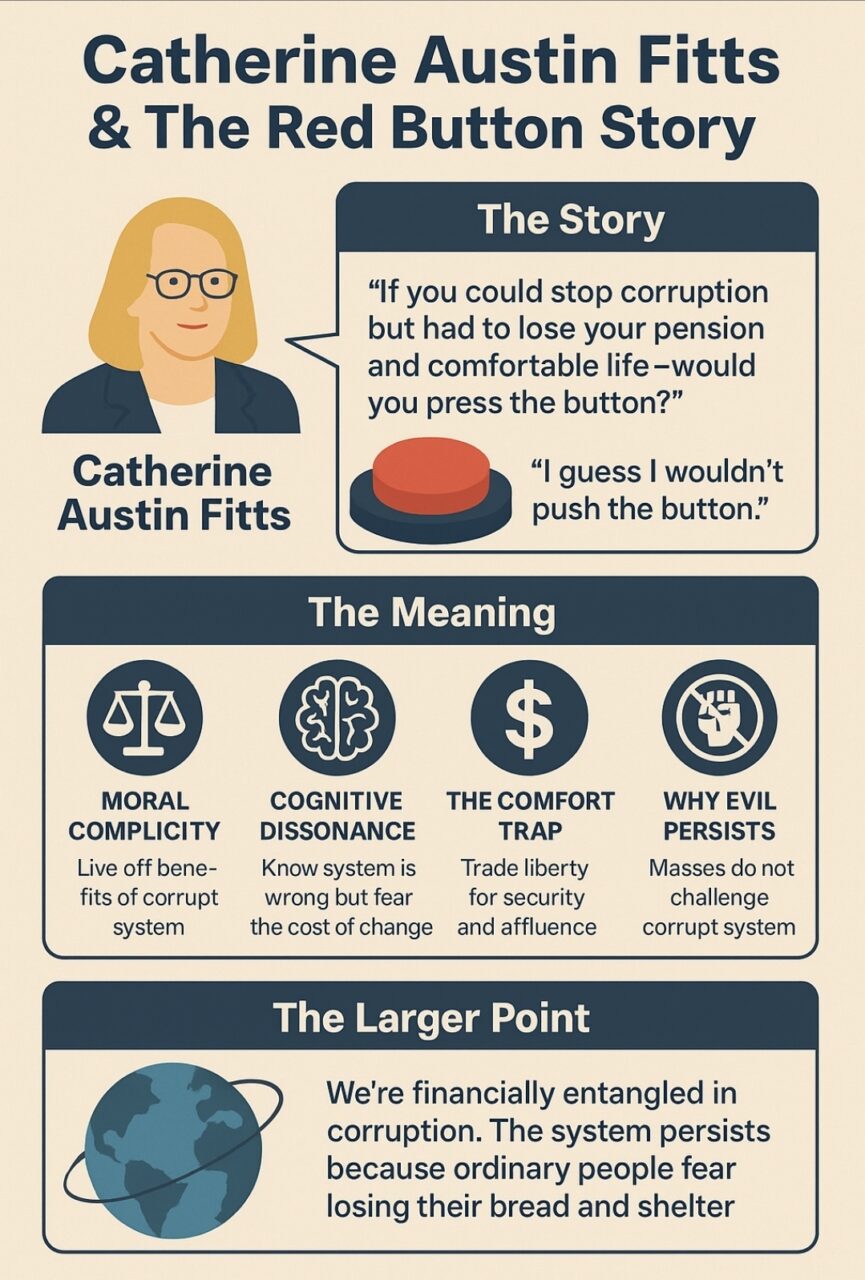
The Origin
- Context: Fitts, a former investment banker and public official, used the image during talks about financial corruption and the “hidden” economy.
- Purpose: Replace abstract policy talk with a moral mirror. The Red Button forces a yes/no choice—cut the euphemisms, face the trade-off.
The Metaphor, Unpacked
- The Button: An instant, nonviolent fix—no policy details required.
- The Cost: Pressing it collapses the perks that corruption subsidizes (asset bubbles, defense jobs, grant streams, insider rents).
- The Revelation: Most people won’t press it. They oppose abuse in theory, but their real preference is “change—without changing me.”
Why It Sticks
- Clarity: A binary choice dissolves foggy rationalizations.
- Agency: It reframes corruption as a collective coordination failure—not just “them,” but “us.”
- Diagnostics: It exposes which incentives, dependencies, and fears truly govern behavior.
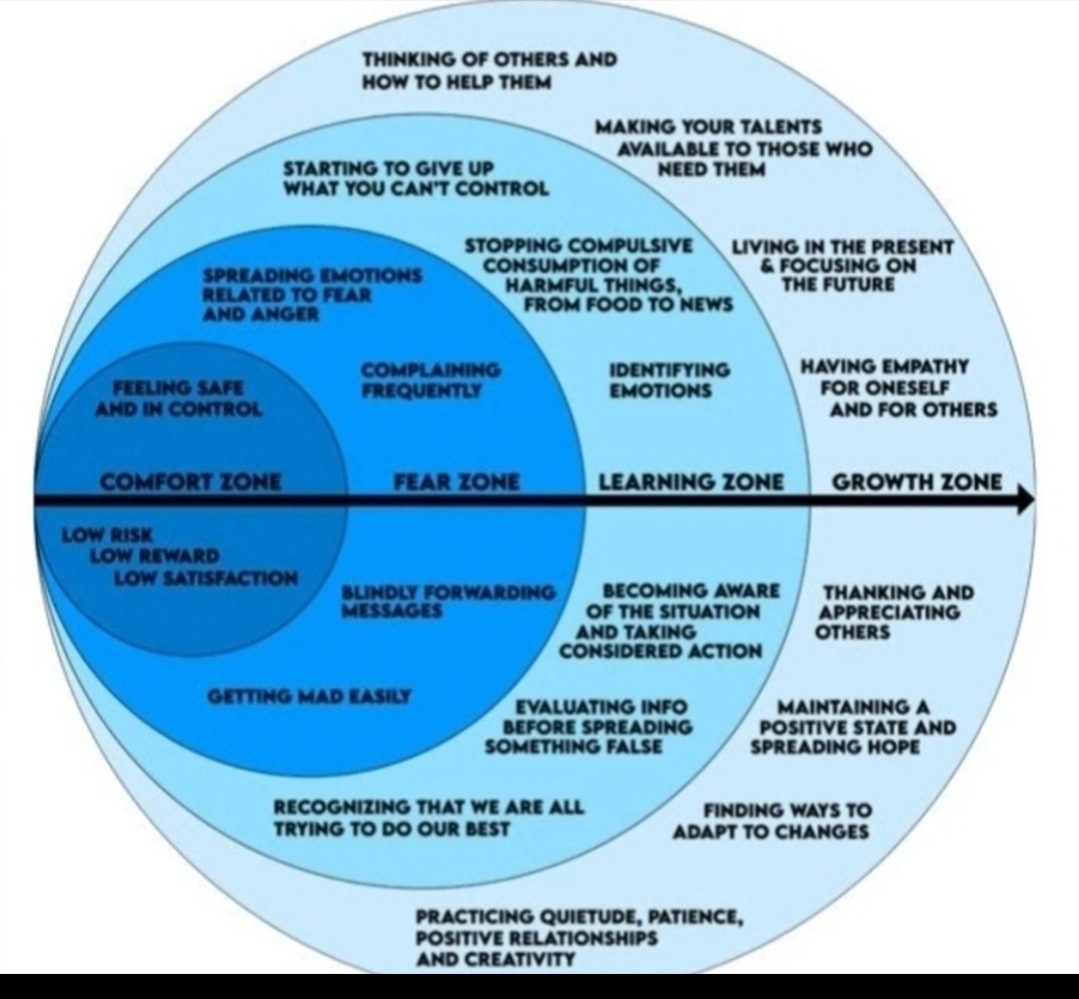
The Deadly Comfort Zone
Comfort feels safe, but in truth it’s a trap.
- Illusion of safety: People believe as long as life looks “normal” (jobs, routines, entertainment), they can ignore systemic corruption.
- Erosion by inches: Corruption grows because people won’t endure discomfort to resist it.
- Moral decay: The unwillingness to sacrifice comfort turns into complicity. Silence becomes permission.
Comfort isn’t neutral—it is the soil in which tyranny grows.
Why Comfort Becomes Deadly
- Passivity invites predation. The powerful exploit the masses’ desire for ease.
- Fear of loss outweighs love of truth. People protect pensions, positions, or reputations instead of pushing back.
- The Slippery Slope. Each compromise sets a new “normal” until corruption is embedded in law, culture, and finance.
- Death of Conscience. Once people silence their own conscience to preserve comfort, truth becomes unbearable to face.
The Moral Math Behind “Not Pressing”
- Livelihood dependence: “If the button shuts down my industry, how will I feed my family?”
- Status & belonging: Fear of being ostracized as disloyal, naïve, or “political.”
- Loss aversion: People weight losses 2–3× more than equivalent gains; inaction feels safer.
- Delegation comforts: “Surely a leader will fix it later.”
- Fragmented harm: When damage is distant (foreign wars, outsourced pollution), conscience dulls.
Common Misreadings (and How to Correct Them)
- “It’s cynicism.”
Correction: It’s a diagnostic. Once you see the incentives, you can redesign them. - “It demands martyrdom.”
Correction: It calls for collective action and staged transitions to reduce personal ruin. - “It’s simplistic.”
Correction: The simplicity is the point: to surface the real veto players—our comforts.
Teaching Points
- Every system has a red button moment. School boards, banks, churches, and governments test whether people value truth over convenience.
- True safety lies outside the comfort zone. Only those willing to sacrifice temporary ease can preserve freedom for the future.
- The Question for Each Generation: Will we trade comfort today for conscience tomorrow, or will we leave our children a world built on corruption?
Applications Across Domains
- Defense & foreign policy: Reduce war dependence by standing up civilian advanced manufacturing and vets-first retraining.
- Healthcare: Sunset perverse fee-for-service incentives; reward prevention and outcome quality; protect providers during the shift.
- Tech & data: Phase out surveillance-ad models; migrate to subscriptions or public-interest funding; guarantee SMB ad alternatives.
- Finance: Close regulatory loopholes that enable extractive arbitrage; pair with small-bank modernization grants.
Red Flags to Watch
- Infinite pilots, zero sunsets: Signals “performative” reform.
- Moral outsourcing: “It’s regulators’ job”—a tell that comfort is in charge.
- Weaponized uncertainty: Endless “we need more study” after harms are established.
- Scapegoat rotation: Blaming fringe actors while core incentives remain intact.
Conversation Starters (for your tapestry nodes)
- “What comfort buys your silence?”
- “Which three bridges would make pressing feasible for your team?”
- “If not a button, what ten levers equal the button?”
- “Who must say yes—and who only needs to stop saying no?”
Quick FAQ
Isn’t this just virtue signaling in reverse?
The whole exercise punishes cheap talk. It asks for real trade-offs.
What if the harms are contested?
Run the Button for multiple scenarios. The pattern of who refuses (and why) is itself revealing.
How do we avoid witch hunts?
Aim at structures, not people. Redesign incentives; don’t moralize livelihoods.
Teaching Points
- Corruption persists because it funds comforts we refuse to surrender.
- The Red Button exposes revealed preferences—what we really choose under cost.
- Durable reform = moral clarity plus transition design.
- Don’t demand martyrs; build bridges.
- Measure progress by how many people can now afford to press.
Reflection Prompt
Name one comfort you would surrender this year to meaningfully reduce a harm you oppose.
What bridge would help you surrender a second comfort?Takeaway:
The comfort zone doesn’t just pacify—it kills. It kills conscience, courage, and eventually liberty.
The red button is always there. The real question is: Do you have the courage to push it?
Bottom Line
The Red Button is not a dare to be heroic—it’s a design brief. If most people won’t press it, the work is to change the conditions so they can. That’s how conscience scales without burning people to ash.

